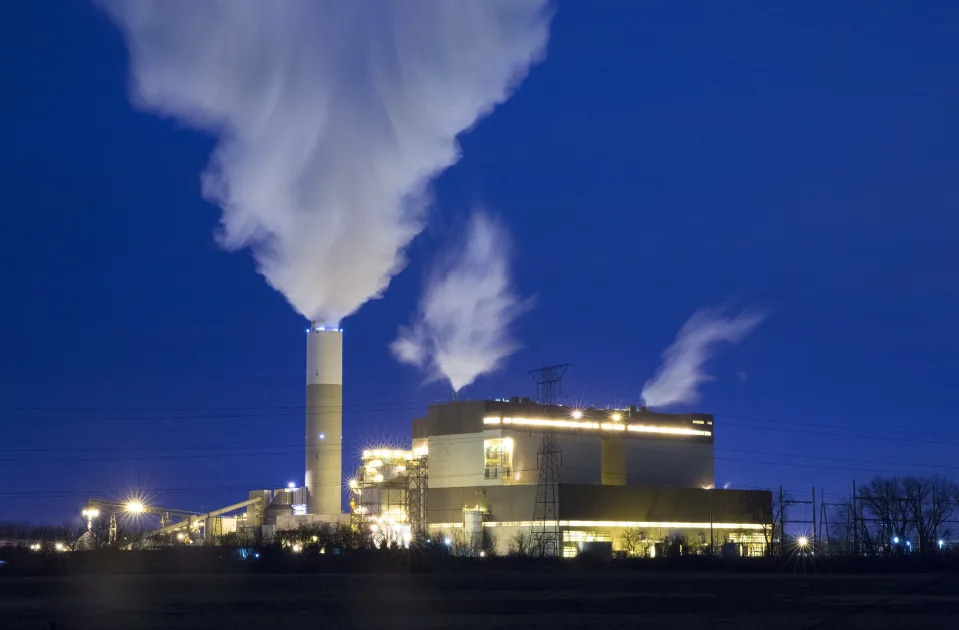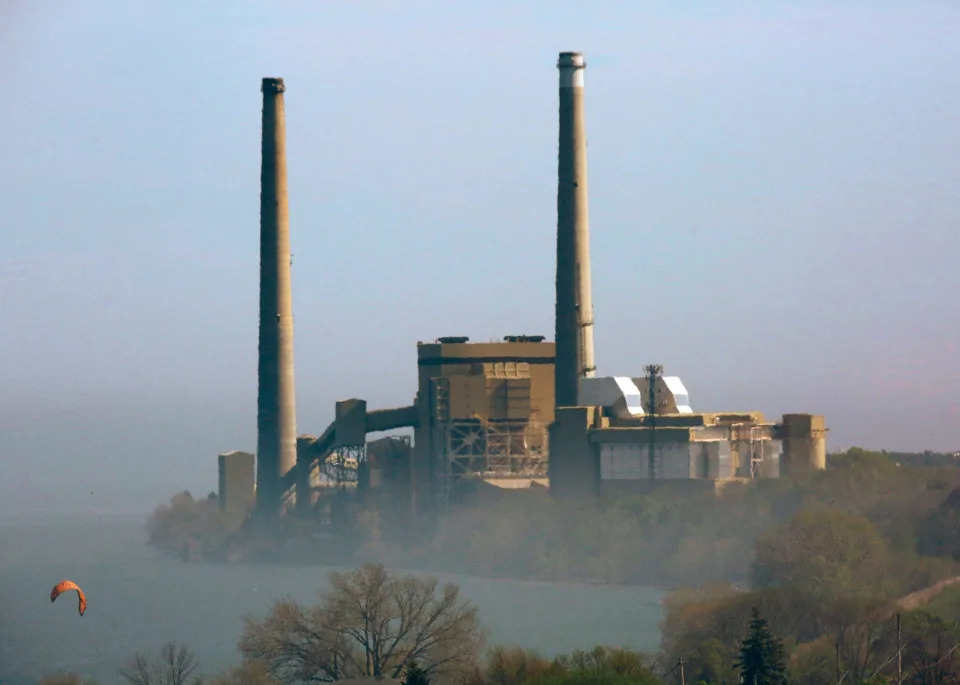Consumer groups, lawmakers seek to reduce impact of $2 billion cost of closing Wisconsin coal plants
Karl Ebert, Milwaukee Journal Sentinel
Wed, November 22, 2023
WEC Energy Group's recent announcement that it will be coal-free by 2032 is likely to bring new urgency to questions about how to pay off outstanding debt on unwanted coal-generation plants and whether utilities should be able to profit from them even after they're shut down.
WEC, the parent company of We Energies and Wisconsin Public Service Corp., recently laid out a schedule that reiterates its commitment to closing the four oldest coal-burning units at Oak Creek over the next two years, while for the first time putting a 2031 closing date on what will be the last coal-burning plant operated by the state's largest utilities.
The company estimates replacing coal generation with renewable energy resources will result in about $2 billion in customer savings over the next 20 years, including $50 million in operations and maintenance costs at Oak Creek.
Alliant Energy is projecting similar savings as it prepares to shut down its two remaining coal-burning plants by 2026.
That's welcome news for customers, but retirement of the plants doesn't, in and of itself, mean lower electricity bills.
How to handle millions in debt remains to be determined
The shutdowns are driven by changed energy economics that have made wind and solar cheaper than coal, resulting in plant retirements before millions of dollars of debt owed to bondholders and investors are repaid. Those costs need to be recouped, and that money will come from the utility's electric customers.
Statewide, the Wisconsin Industrial Energy Group estimates those "sunk costs" will add up to more than $2 billion dollars, mostly due to pollution controls installed by the utilities in the past decade.
Meanwhile, Wisconsin's utilities project billions in spending to develop renewable resources to replace the coal-burning plants and meet future demand, costs that also will be borne by ratepayers.
Those costs are a necessary step toward meeting state, local and corporate carbon reduction goals, but they can be counterbalanced by measures that prevent utilities from profiting on that outstanding debt, said Tom Content, executive director of the Wisconsin Citizens Utility Board.
"Nobody was banking on spending all that money and not having that generation last," Content said. "But the economics of coal changed, the utilities' decarbonization plans and interest in renewable energy changed. The shareholders are doing very, very well on all this new investment and we really want customers to get a break on plants that are no longer being used shut down. That's why our our tagline is no profit for dead coal."
Bill would expand options for reducing customer burden
Wisconsin has a little-used system for protecting customers from some of those costs, a financing tool known as securitization.
First authorized by the state Legislature in 2004, securitization involves issuing bonds to refinance the remaining value of a coal plant. The savings come from the difference between the interest rate on the bonds and the rate of return, or profit, the utility would otherwise be able to collect from customers. In Wisconsin, utilities' profits rates are between 9% and 10%.
More than a decade passed before the law was used for the first time, when We Energies refinanced $100 million in outstanding debt after it decommissioned the Pleasant Prairie Power Plant in 2018. Refinancing that debt is estimated to save We Energies customers $40 million over 15 years.
We Energies also agreed last year in a proposed settlement of its rate case to securitize $100 million of the $656 million it still owes on the Oak Creek power plant. That agreement was rejected by the Wisconsin Public Service Commission, which sought more information about the amount for refinancing and whether it could be bigger.

The We Energies Power Plant in Pleasant Prairie closed in 2018. The following year the Wisconsin Public Service Commission approved refinancing $100 million of the plant's unpaid debt resulting in about $40 million in savings for for the utility's electric customers.
Why refinance only part of that debt? The answer is twofold.
First, state law limits the use of securitization to certain pollution controls. That was the rationale for using it to refinance only about one-fourth of the outstanding debt at Pleasant Prairie.
Second, refinancing requires a utility to forgo profit on the plant's remaining value, which can be at odds with maximizing shareholder returns, and the law requires securitization to be voluntary.
Those issues came into play earlier this month, when the PSC set Alliant's 2024 and 2025 gas rates. In comments submitted during the rate case, consumer advocates and the Wisconsin Industrial Energy Group argued for securitization of some, if not all of the $385 million in remaining debt on air-pollution control equipment at Alliant's Edgewater Generating Station. Those costs represent the majority of the $472 million that's still owed on the plant, which is scheduled to shut down in 2025.
PSC Chairwoman Rebecca Cameron Valcq pointed out that securitization was off the table because Alliant had not proposed it despite a request from commissioners during the previous rate case for the company to come back with a suite of financing alternatives.
"It's clear that the state statute as is currently written does not allow this commission to require securitization to be used. It is as clear as the day is long. That's the way the statute is written," Valcq said. "So all of the noise about requiring them to securitize, requiring them to use environmental trust financing, all that time and energy, in my opinion, would be better utilized, lobbying for changes to the statute, because we're not within our authority to order securitization. If it comes to us as a proposal, we have an ability to look at it."
As commissioners reviewed each of the investor-owned utilities' rates over the past month, they repeatedly stressed that finding ways to reduce the impact on customers of shutting down coal plants needs to be included during consideration of their next rate adjustments.
"I think all utilities adequately put on notice that this is going to be an issue," Valcq said during final consideration of We Energies' 2024 rates.

Alliant Energy plans to close the Edgewater Power Plant, a coal- powered generating facility in Sheboygan in 2025.
Proposal would allow utilities to refinance all plant retirement costs
A bill introduced recently by state Sens. Robert Cowles, R-Green Bay, and Duey Stroebel, R-Saukville, would change that. The bill would allow utilities to refinance all of the costs associated with retiring a coal plant and also give the PSC authority to order securitization.
Cowles said the bill is an attempt to provide some relief for the state's electric customers at a time when large increases in electric rates have pushed Wisconsin electric costs above most other Midwest states.
"We''ve got something like $2.5 billion of plants that are going to close, and the idea is that you're going to rate base all this? Rather than securitize it?" Cowles said. "If you securitize it, you're going to be able to do it in a much cheaper way. That's the purpose of the bill."
The bill also would require utilities to submit biennial resource and reliability plans to the PSC to ensure new construction best meets the state's needs and provide advance notification to the PSC of any plans to shut down large power-generating facilities.
Todd Stuart, executive director of the Wisconsin Industrial Energy Group, said the manufacturers WIEG represents, 25 of the state's largest energy users, share consumer advocates' concerns about rising electric rates. Stuart declined to comment directly on Cowles' legislation, but he noted WIEG has been an active proponent of using securitization in the We Energies and Alliant rate cases.
"Now is a good time to raise questions regarding the speed and cost of the massive utility capital spend in Wisconsin," he said. "We still need to address the problem of rate recovery for power plants that are about to be retired."
The state's utilities have already voiced their opposition to the bill through the Wisconsin Utility Association, the lobbying group that represents the state's investor-owned gas and electric utilities. WUA circulated a memo earlier this month urging lawmakers not so sign on as co-sponsors of Cowles' bill and several others that aim to create greater transparency on energy issues for consumers.
"They need to be free to make their own financial decisions at the best time for when they believe them to be instead of having the commission order them. They just need the flexibility to be able to do that when it's appropriate," said Bill Skewes, WUA's executive director.
Cowles said that opposition was not unexpected and overcoming the utilities' lobbying power is no small challenge. But, he believes, recent electric rate increases across the state have put the issue of energy costs at the forefront of all classes of utility customers and lawmakers are hearing about it.
"Hopefully we get a hearing on this bill, and hopefully the commissioners come, or at least the chairman comes in and says we want this authority," Cowles said. "And hopefully the governor comes in. This is one of these things where we have an opportunity to make things less financially difficult for people. Do we take advantage of it or not? We'll see."
This article originally appeared on Milwaukee Journal Sentinel: Bill aims to cut customer impact of $2 billion cost of closing Wisconsin coal plants
No comments:
Post a Comment